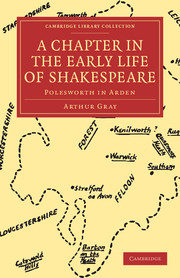Book contents
- Frontmatter
- Contents
- ILLUSTRATIONS
- SECTION 1 The Problem stated
- SECTION 2 The Marlowe fiction
- SECTION 3 The Greenwood theory
- SECTION 4 The Stratford legend
- SECTION 5 Does Shakespeare rail?
- SECTION 6 William Shakespeare, gentleman
- SECTION 7 Concerning Genius
- SECTION 8 Stratford fact and fable
- SECTION 9 The flight to London
- SECTION 10 Shakespeare's silence about Stratford
- SECTION 11 Concerning Arden
- SECTION 12 Of Poets, Patrons and Pages
- SECTION 13 What happened in 1572
- SECTION 14 Polesworth
- SECTION 15 Shakespeare in North Warwickshire
- SECTION 16 Shakespeare's road to London
- SECTION 17 Michael Drayton
- SECTION 18 The Polesworth circle
- SECTION 19 The Gooderes
- SECTION 20 The Sonnets
- SECTION 21 Southampton
- SECTION 22 Warwickshire scenes in Shakespeare's youth
- SECTION 23 The last days
- Plate section
SECTION 6 - William Shakespeare, gentleman
Published online by Cambridge University Press: 07 September 2010
- Frontmatter
- Contents
- ILLUSTRATIONS
- SECTION 1 The Problem stated
- SECTION 2 The Marlowe fiction
- SECTION 3 The Greenwood theory
- SECTION 4 The Stratford legend
- SECTION 5 Does Shakespeare rail?
- SECTION 6 William Shakespeare, gentleman
- SECTION 7 Concerning Genius
- SECTION 8 Stratford fact and fable
- SECTION 9 The flight to London
- SECTION 10 Shakespeare's silence about Stratford
- SECTION 11 Concerning Arden
- SECTION 12 Of Poets, Patrons and Pages
- SECTION 13 What happened in 1572
- SECTION 14 Polesworth
- SECTION 15 Shakespeare in North Warwickshire
- SECTION 16 Shakespeare's road to London
- SECTION 17 Michael Drayton
- SECTION 18 The Polesworth circle
- SECTION 19 The Gooderes
- SECTION 20 The Sonnets
- SECTION 21 Southampton
- SECTION 22 Warwickshire scenes in Shakespeare's youth
- SECTION 23 The last days
- Plate section
Summary
Having considered the method of the dramatist, let us turn to the nature and breeding of the man, as set down in the recorded impressions of those who were his contemporaries and friends. Among them was John Davies of Hereford, whose lines on Shakespeare's ‘reigning wit’ I have already quoted: they are contained in a book by him called The Scourge of Folly, published about 1611, and are part of an eight-line epigram addressed to ‘Our English Terence, Mr Will Shakespeare.’ The lines preceding this quotation run:
‘Some say (good Will), which I in sport do sing,
Hadst thou not played some kingly parts in sport,
Thou hadst been a companion for a King,
And been a King among the meaner sort.’
That, surely, is a remarkable tribute of admiration. In the title of the epigram Davies addresses Will as a dramatist: but the lines convey the popular impression of him as an actor. Players were not usually esteemed gentlemen in Shakespeare's day. But, says Davies, apart from his written plays there was something in the man, more than physical presence, more than adaptability to high scenic parts, that suggested a loftiness that would befit kings' chambers.
- Type
- Chapter
- Information
- A Chapter in the Early Life of ShakespearePolesworth in Arden, pp. 27 - 32Publisher: Cambridge University PressPrint publication year: 2009First published in: 1926

